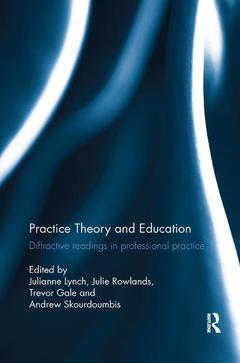Description
Practice Theory and Education
Diffractive readings in professional practice
Coordinators: Lynch Julianne, Rowlands Julie, Gale Trevor, Skourdoumbis Andrew
Language: English
Subjects for Practice Theory and Education:
Keywords
Chat; Academic Workload Models; Julianne Lynch; Follow; Julie Rowlands; Practice Theory; Trevor Gale; Word Referent Relations; Andrew Skourdoumbis; Chat Concept; Discursive Practices; social theory; Social Justice Dispositions; practice-based approach; De Certeau’s Conceptualisation; education; Beginning Teachers; higher education; Higher Education Field; research methodology; Dense; social practice; Education Policy Networks; neo-rationalism; Disengaged; subjectivity; Breast Implant Surgery; professional practice; Non-representational Theories; evidence-based practice; Clips; best practice; Chemistry Lecture; art practice; Philanthropic Field; literary practice; Everyday Practice; policy; Vygotskian Project; Philanthropic Involvement; Secondary PW; Bourdieu 1990b; Primary Habitus
Publication date: 06-2018
· 15.6x23.4 cm · Paperback
Publication date: 12-2016
· 15.6x23.4 cm · Hardback
Description
/li>Contents
/li>Readership
/li>Biography
/li>
Practice Theory and Education challenges how we think about ?practice?, examining what it means across different fields and sites. It is organised into four themes: discursive practices; practice, change and organisations; practising subjectivity; and professional practice, public policy and education.
Contributors to the collection engage and extend practice theory by drawing on the legacies of diverse social and cultural theorists, including Bourdieu, de Certeau, Deleuze and Guattari, Dewey, Latour, Marx, and Vygotsky, and by building on the theoretical trajectories of contemporary authors such as Karen Barad, Yrjo Engestrom, Andreas Reckwitz, Theodore Schatzki, Dorothy Smith, and Charles Taylor. The proximity of ideas from different fields and theoretical traditions in the book highlight key matters of concern in contemporary practice thinking, including the historicity of practice; the nature of change in professional practices; the place of discursive material in practice; the efficacy of refiguring conventional understandings of subjectivity and agency; and the capacity for theories of practice to disrupt conventional understandings of asymmetries of power and resources. Their juxtaposition also points to areas of contestation and raises important questions for future research.
Practice Theory and Education will appeal to postgraduate students, academics and researchers in professional practice and education, and scholars working with social theory. It will be of particular interest to those who wish to move beyond the limiting configurations of practice found in contemporary neoliberal, new managerialist and narrow representationalist discourses.
1. Introduction: Diffractive readings in practice theory Julianne Lynch, Julie Rowlands, Trevor Gale & Andrew Skourdoumbis
Section 1. Discursive practices: Practising words, writing and theory
2. Exploring words as people’s practices Dorothy E Smith
3. Accounting for practice in an age of theory: Charles Taylor’s theory of social imaginaries Steven Hodge and Stephen Parker
4. Michel de Certeau: Research writing as an everyday practice Julianne Lynch and Kristoffer Greaves
5. ‘Gestures towards’: Conceptualising literary practices for Crises of Ecologies David Harris
Section 2. Practice, change and organisations
6. Shaping and being shaped: extending the relationship between habitus and practice Julie Rowlands and Trevor Gale
7. Practicing policy networks: Using organisational field theory to examine philanthropic involvement in education policy Joseph J. Ferrare and Michael W. Apple
8. A Cultural-Historical Approach to Practice: working within and across practices Anne Edwards
9. The development of a text counselling practice: An actor-network theory account by Ailsa Haxell
Section 3. Practising subjectivity
10. Parsing and Re-Constituting Human Practice as Mind-in-Activity Peter H. Sawchuk
11. Boobs and Barbie: Feminist posthuman perspectives on gender, bodies and practice Julia Coffey and Jessica Ringrose
12. The practice of survival: reflexivity and transformation of contract-employed beginning teachers’ professional practice Michelle Ludecke
13. Classroom activity systems and practices of care Catherine Smith and Russell Cross
Section 4. Professional practice, public policy and education
14. Bad research, bad education: The contested evidence for evidence-based research, policy and practice in education Michael A Peters and Marek Tesar
15. Deliberations on the deliberative professional: Thought-action provocations Trevor Gale and Tebeje Molla
16. The temptations and failings of teacher effectiveness research: Provocations of a ‘practice perspective’ Andrew Skourdoumbis and Julianne Lynch
Julianne Lynch is Senior Lecturer in Curriculum and Pedagogy at Deakin University, Australia. Her research focuses on curriculum innovation and the everyday practices of teaching and learning, particularly in relation to new media and new communication technologies.
Julie Rowlands is a Senior Lecturer in Education Leadership at Deakin University in Australia. Her research takes a critical sociology of education approach, drawing particularly on the theories of Pierre Bourdieu, to examine higher education systems, governance, leadership, academic work and organisational change.
Trevor Gale is Professor of Education Policy and Social Justice at The University of Glasgow, where he heads the School of Education. He is a critical policy sociologist researching social justice in contexts of influence and of practice in education.
Andrew Skourdoumbis is a Senior Lecturer in Education (Pedagogy and Curriculum) at Deakin University, Australia. His research engages with matters of curriculum theory encompassing policy analysis, teacher practice and educational performance. Andrew is interested in global reform efforts in education that impact teacher practice and the way that exacting methods of research govern school education policy and teacher performance.




